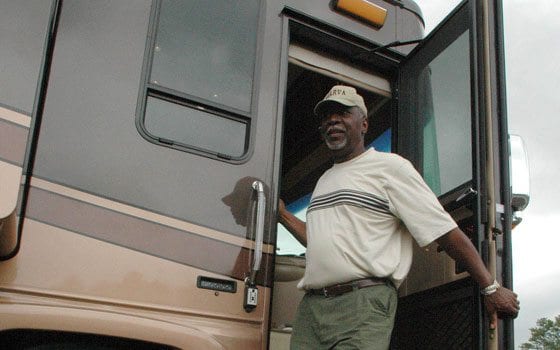
“They felt like a black person out by yourself just wasn’t personally safe,” said Horton, of Decatur, Ga. “But traveling all over the United States and Canada since the 1970s, I’ve had no problem.”
Joseph said the idea of camping creates an uneasiness among some blacks that is strong enough to prevent many from ever venturing into the outdoors, yet difficult to explain.
“It’s just a feeling that it’s not somewhere they ought to be,” said Joseph.
A survey commissioned by industry groups estimated that as many as 30 million Americans have camped, but only 300,000 of them are black, said Linda Profaizer, president of the National Association of RV Parks and Campgrounds.
Profaizer said tailgating at football games is popular among black RV owners including Supreme Court Justice Clarence Thomas, who travels the country in a big motor coach with his wife when not deciding cases.
But most blacks have been slow to adopt camping as a hobby, she said.
“My thought is that they just have not been exposed to it,” she said.
States including Washington and California have launched programs to get minorities interested in outdoors recreation including camping, and so has the National Park Service.
Longtime park ranger Shelton Johnson, who is black, said he began telling the story of black Buffalo Soldiers at Yosemite National Park in California partly to lure more black visitors. Johnson has seen more minority visitors in recent years, but there’s still not many.
“As far as I’m concerned it’s a major issue,” said Johnson. “As the so-called ‘browning of America’ goes on, if black people and other people of color aren’t visiting campgrounds and parks, how is the National Park Service going to reach the public in the future?”
Founded by a small group of enthusiasts 16 years ago, the National African American RVers Association has about 3,000 member families nationwide. Most are in the warm-weather South, and hundreds of rigs show up at regional gatherings called rallies.
Walk around a campground filled with black people and it’s a lot like being in a campground filled with whites. Members arrive in everything from small trailers to plush motor homes that sell for more than $1 million. Friends sit in lawn chairs between campers telling stories and laughing while kids fish and ride bicycles. Cooking is a daylong activity.
Gladys Curtis of Houston is active in both NAARVA and mostly white camping groups, and she has noticed at least one difference between the way the races camp.
“When we go to the [white] rallies we hear a lot of country and western” music, said Curtis, president of a black camping group from Texas. “We’ve had a Motown review, big band, blues. Not a lot of country.”
(Associated Press)






